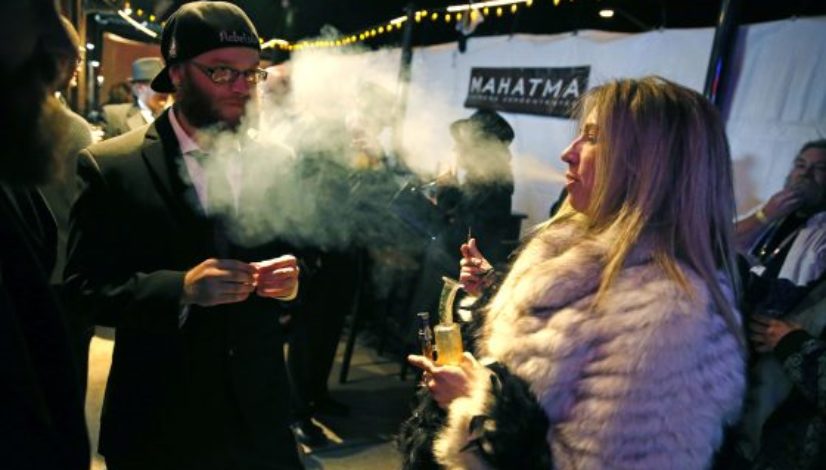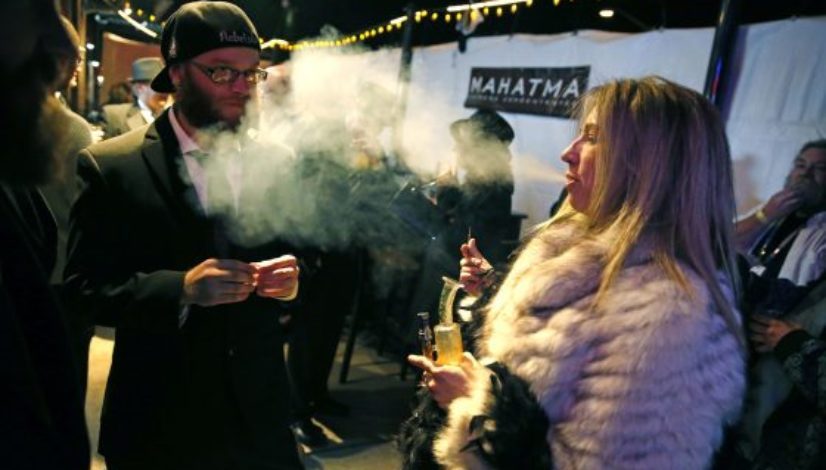Colorado legislature looks to address the “wild west” of pot clubs

Published: Mar 7, 2017, 2:14 pm • Updated: Mar 7, 2017, 2:37 pm
By John Frank and Jon Murray, The Denver Post
The legalization of recreational marijuana in Colorado nearly five years ago opened a vast landscape of unknowns, and now the state is looking to settle one of the last frontiers.
The General Assembly is advancing bipartisan legislation to make Colorado the first state to allow pot clubs — an issue once considered taboo but one the industry says is overdue.
“What we are lacking as an industry and as consumers is a place to consume,” said Jordan Person at Denver NORML, the local chapter of a national organization that favors legalization.
The Republican-led state Senate is scheduled to hear a measure Wednesday that would give local governments the authority to allow private, membership-only clubs with indoor smoking and consumption of bring-your-own cannabis. It comes as Denver looks to implement Initiative 300, the voter-approved measure to allow marijuana consumption zones at private businesses that obtain permits.
Related stories
- Colorado Senate passes first-in-nation pot clubs bill
- Colorado governor pledges to veto pot clubs bill unless changes made
- Colorado pot clubs one step closer to reality as bill clears first hurdle
- Denver’s social marijuana use panel clashes over rollout details
- Aspen may be open to private marijuana clubs after all
Colorado’s move toward Amsterdam-like clubs once again puts the state under what Person calls the national “marijuana microscope.” Other states that legalized weed are moving in the same direction, but Colorado could finish first if lawmakers and Gov. John Hickenlooper reach a consensus on legislation.
The Trump administration’s recent signals toward a potential crackdown on marijuana only complicate the conversation as lawmakers tip-toe on the issue, mindful that each additional step may cross the line and draw tougher enforcement.
The effort is not without controversy in Colorado. Two bills on the topic split lawmakers and the cannabis industry this legislative session, generating lengthy hearings replete with unusual testimony about bong hits, munchies and marijuana-clouded yoga studios. One of those measures, which would have allowed clubs to sell their own weed, has died.
“It’s just very reflective of how much difficulty and disagreement there is across the state and in our individual communities about how to deal with it,” said Sen. Bob Gardner, a Colorado Springs Republican who helped craft the first recreational marijuana rules in 2013 before retail sales began in 2014.
The political will to establish further rules for cannabis consumption shifted this year after Colorado lawmakers, even those who opposed legalization, became increasingly frustrated with the skunky clouds of pot smoke in public places, such as parks and bus stops.
“It’s a problem we’ve got to address,” Senate Republican leader Chris Holbert said early in the session.
Sticking point
As part of the issue, the industry and lawmakers are seeking to define what Amendment 64, which legalized recreational put sales and use but prohibited “openly and publicly” consuming marijuana, means in practice.
That phrase has bedeviled lawmakers. “It’s one of the things we were totally unable to do,” said Sen. Cheri Jahn, D-Wheat Ridge.
Senate Bill 184 would define “open and public” this way: Marijuana consumption is not allowed in a place easily viewable from outside its perimeter and where “a substantial number of the public” has access without restriction.
That’s broader and more permissive than the definition already set in ordinance by some local governments, including Denver, which allows use only on private property — notwithstanding the new exemption for permits it will issue to businesses under Initiative 300. Local governments still will retain the right to be more restrictive under the Senate bill.
In terms of defining the major elements of Amendment 64, “I think this actually would be the last piece that needs to be done,” said Kevin Bommer, the deputy director of the Colorado Municipal League, who helped draft the bill.
Under the legislation, pot clubs would not be able to sell marijuana, alcohol or food on the premises — members would bring their own — and local officials who permit the establishments could impose tighter restrictions.
A competing measure, Senate Bill 63, would have allowed local governments to license pot clubs that are open to the public and sell marijuana, akin to a bar that serves alcohol. But it failed in a Senate committee because of concerns it went a step too far.
Right now, as many as 30 pot clubs are operating in Colorado, according to a legislative analysis. State law neither explicitly permits nor forbids them.
The proponents of Amendment 64 argue the constitutional provision created the opening for clubs and disputes the notion that local governments can ban them, as the Senate bill allows.
Rob Corry, a marijuana law attorney who represents existing Colorado clubs, supported the bill that regulated and licensed pot clubs. But he argues the measure moving forward represents “a prohibition mentality that voters wanted to jettison.”
“I think that people in the middle for whatever reason are OK with the for-profit sale of packaged marijuana … and maybe it’s a leap for some people,” he said, “to get their heads around this concept that, yes, adults do like to get together and use it together in places other than our homes, like alcohol.”
Denver’s Initiative 300
Denver is closely monitoring how the bill would impact the city’s new Initiative 300, which will allow some businesses to create marijuana consumption areas later this year.
Ashley Kilroy, the city’s licensing director and the mayor’s marijuana policy director, said the bill wouldn’t preempt the local measure as currently written. “There has long been a need for the state to clarify the legal status of so-called private marijuana clubs, so we’re glad the legislature is tackling the issue, and doing so in a way that respects local control,” she said.
The new ordinance, approved by nearly 54 percent of voters in November, takes a different tack from allowing private clubs. Its backers hoped instead to make social marijuana use more mainstream by requiring the city to issue permits to allow cannabis consumption zones in a broad array of businesses — but only if the businesses that apply have received backing from a local neighborhood or business group.
Marijuana shops, bars and restaurants that serve liquor can’t participate in Denver’s budding program because of state laws and regulations.
Rachel O’Bryan, who led the anti-Initiative 300 campaign, wanted the legislature to put a crimp on Denver’s new effort by placing a more restrictive definition of “open and public use” in state law.
“What I have seen is a lot of confusion around this bill,” O’Bryan said. To her, the proposed definition is troubling because businesses only would need to obstruct the view from outside. “Anyplace you close a door, you can have social consumption,” O’Bryan said.
O’Bryan is concerned about allowing private clubs because the bill would let members bring in their own marijuana, unchecked. Other aspects pose safety and liability issues, she said.
Gardner, the Senate bill sponsor, still has concerns about marijuana, too. He says there are “social costs and implications that we’ll never be able to grapple with.”
But the bill, he said, is the first step toward a better system than the “wild west” pot clubs in Colorado now.
This story was first published on DenverPost.com
Topics: 2017 Colorado legislation, Colorado, pot clubs, public consumption, SB17-184, social use




